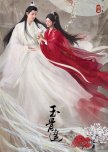
This review may contain spoilers
What I would change: The last four episodes (29 to 32)
It's a good story overall, and I've enjoyed it.My Review contains many spoilers: don't read if you haven't watched the series yet.
The last four episodes (29 to 32) could have been better scripted, as some plot choices feel weak; they don't have any purposes other than to add unnecessary twists & turns.
And the drama’s ending...
Instead of delivering a satisfying conclusion, it forces suspense with an ambiguous scene that lacks context or payoff. Rather than a clever twist, it comes across as empty and confusing. Most viewers, myself included, are left wondering what it was supposed to mean. If the goal was to create an open-ended mystery, it fails because it lacks substance, and instead of a thought-provoking conclusion, it feels like an unresolved, last-minute attempt to appear deep without any real meaning.
So let's start with what I would change to make this a better story!
Ep. 29 - 24:30 min
Why would the princess chose to kill herself? But most importantly, why would she chose to kill herself in such a way that not only endangers Shangguan Zhi but also wastes an opportunity to make her sacrifice meaningful? As someone raised in the palace, she should be resourceful and strategic enough to devise a last-minute plan.
Frankly, this plot twist is unnecessary and leads to even further unnecessary drama, thus it should be erased. Let's examine something else that could prevent her death:
Ep. 28 - 38:00 min
Zhuo LanJiang meeting the mastermind (Jia Quan - identity not yet revealed) and his personal assistant (Zuo Jingfei) at night time in an undisclosed location.
Ep. 30 - 5:30 min
Zhuo LanJiang meeting the mastermind (Jia Quan - identity revealed) and his personal assistant (Zuo Jingfei) during daytime at the "Grand Commandant's Residence".
After comparing both meeting location, we can clearly see the same curtains and the same bookshelves in the background. Thus, we can deduce they meet in the same location.
We know Zhuo Lanjiang's motivations: to avenge his father. He's not there to stretch things nor investigate any further. This said, he had a very good opportunity to do this in Ep. 28's meeting. He could kill both at once swiftly at nighttime and try to escape alive.
But let's say for suspense sake he does not do it just yet. Plus, he gets to witness the presence of Mr. Chen (the organization's accountant who brought the ledgers with him) as he's being escorted to his new room. This opens the plot twist for him to look for those ledgers later which brings us at back at Ep. 29, right before the Princess death scene, the one we want to get rid of.
So here's what should happen:
(This removes all those scenes: princess's death, Shangguan Zhi going to jail, Pan Yue begging his father, Shangguan Zhi's trial + battle, them becoming fugitives, Zhuo LanJiang dying uselessly and in a very stupid way, etc.)
Ep. 29 - from 18:40 to 24:30 min
This is when the princess finds out her sister's husband (Jia Quan) is the great villain she and Pan Yue have been investigating. This triggers him threatening her. But frankly, why would he ask her to kill Shangguan Zhi? That's just plain not plausible considering his shrews character. If he wanted Shangguan Zhi dead, he could have had her dead 100 other ways anytime he wants.
In my opinion, once he made sure to make her understand that he can and will kill her and her sister (and make it look like an accident) if she tries to interfere, his most likely reaction would be to prohibit her to leave the residence and keep her under watch at all times until the completion of his "Grand Marshal" promotion ceremony to ensure she won't leak any information.
Next would come the scene from Ep. 30 - 5:30 min
Zhuo LanJiang meeting the mastermind (Jia Quan - identity revealed) and his personal assistant (Zuo Jingfei) during daytime at the "Grand Commandant's Residence".
But this time, he kills both in stealth mode, then proceeds to look for the ledgers, finds them and escape successfully.
There should be a commotion once Jia Quan's death is being noticed. It should be speculated that it must be related to the assassin that tried to kill Pan Yue the other day. The Princess would later go search for the ledger where she found evidence of Jia Quan's name change, then make a plan to meet with Pan Yue in order to discuss their next move.
Meanwhile, Zhuo LanJiang gives the accounting ledgers to either Pan Yue or Shangguan Zhi (or both, wathever suits the plot), tells them he fulfilled his vengeance (the bad guy is dead) and he plans to head back home with his girlfriend and marry her.
Next, we should obviously see Zhuo LanJiang have some happy romantic reunion with Bai Xiao Sheng.
Then, the princess meeting with Pan Yue and Shangguan Zhi to decide what will be done.
From there, I don't have anything concrete in mind, but I guess the most obvious would be:
- The princess confess everything to her sister.
- The wedding between the princess and Pan Yue gets cancelled.
- The evidence against Jia Quan gets deposited to help close his death's investigation.
- Pan Yue and his father reconcile.
- Pan Yue will confess everything to Shangguan Zhi's brother as promised. She should also have a moment alone with her brother to settle things.
- Pan Yue gets back his Heyang's Magistrate position and finds a way to offer Zhuo LanJiang a good position too in managing the docks (or wathever else that fits his fancy in order to compensate him for shutting down his clan. Maybe letting him reopen his clan/private business?)
- Pan Yue and Shangguan Zhi get married in Heyang at the same time than Zhuo LanJiang and Bai Xiao Sheng (double wedding).
Oh, and another useless scene is this one:
Ep 29: 6 min
Pan Yue's brother revealing to a stanger that Shangguan Zhi is Yang Caiwei.
Only Pan Yue's father should know about this, and this information should not have been revealed to anyone else in the household.
Was this review helpful to you?

Cute but many inconsistencies
I won’t go into too much detail, but here comes my usual rant: this was a story with real potential—flawed, yes, with plenty of inconsistencies, though not as bad as in other dramas. For the most part, I was willing to overlook them and stay invested.But then came the last two episodes...
To my great disappointment, they were absolute rubbish. They completely undermined everything the story had built up until then. It ruins the whole show and all the effort that had gone into making it something worthwhile.
I'll rewrite a decent ending on my blog because it's too much of a waste to leave it as is.
Was this review helpful to you?

This review may contain spoilers
Cute but nothing impressive
Cute-Funny romance with cute actors on a sports theme.I picked this one because I like Esther (she's really cute and funny) and the male lead is super handsome.
I felt that 23 episode was a little short. I would have aimed for 25 because some things were rushed near the end.
1) I like Esther's acting in this type of role: cute, funny, and silly. BUT, there were moments I thought it was a little too much. There are some scenes where the director should have toned it down a bit.
2) I got distracted by the "fashion show": they made her change outfits every single episode (or more), and she never wears the same thing twice. Mind you, she only carried a small luggage, so how could she have the space to pack 7 snowsuits/winter coats??? I understand it's for aesthetics and that it doesn't need to be too logical, BUT they should have toned it down by bringing back some previous outfits a couple of times. They also went a little overboard with the silly babyish outfits (especially her pyjamas), so this is another thing that should have been toned down a little bit, because too much is like not enough. There needs to be a balance.
= Light Spoiler =
What I feel has been rushed
1) For example, the relationship resolution between the 2nd male and female lead (Yan & Jiang Nan Feng). Since this is a "feel good" romance, I was kinda expecting a positive ending for them, so I felt a little disappointed when things were left unsaid in the last 3 episodes.
2) The resolution between Wei Zhi and her crooked ex-employer. We are left guessing what happened.
Artistic Choice that could have gone a different way
1) The male lead's reaction/decision to "take his distance" and let Wei Zhi see this as a breakup without explaining thoroughly what happened with her dad and how he feels. It felt a little immature and not worthy of his character. Communication is the pillar of a healthy, successful relationship, thus, he should not have left things the way he did. There was no need for imposing a breakup while both of them "tiddy up" their personal lives. (Maybe he told her, but we are left guessing because it hasn't been shown during screen time since this drama was rushed in only 23 episodes.)
Plot Hole
Episode 10 (38 min)
Yan shows Beici that Jiang NanFeng deleted his contact on WeChat and confronts Jiang Nanfeng regarding this.
Jiang Nanfeng answers him: Did you even ask Wei Zhi what really happened?
I thought we would get to learn this later in the show, but no! It never gets explained. What are we supposed to understand exactly? What has "really happened"? Is it supposed to be something so obvious that it doesn't deserve any more script time???
It's shown that:
- Yan has feelings for her since way back in the past.
- She treats him with utter disrespect on the last day before her departure, and then deletes his contact.
- She adds him back to WeChat after Yan confronts her about this.
- Wei Zhi asks her, "What's the deal with you and Yan?" She answers, "We just set up a class for tomorrow morning. We're adults. No need to hold grudges. I just want things to be less awkward when we all hang out. "
There is no further explanation of that situation or sentence in the show.
Was this review helpful to you?

This review may contain spoilers
Average Drama, nothing remarkable...
I always start watching a drama without bias and try to stay open-minded.This drama was ok, but quite average, with nothing remarkable... I won't want to watch it a 2nd time.
I disliked the instrumental OST / sound FX: it sounded a little cheap and too cartoonish. But I guess it was the director's intent.
The OST with lyrics was ok, but it did not touch me.
The actors and costumes were good-looking, but I did not get attached to them, and I did not share their emotions as I've experienced with other dramas.
The ending spans over the last 4-5 episodes. I found the story's direction to be disappointing. I didn’t like the choices the director and writer made, and there were a lot of inconsistencies. They could have handled it much better. The plot felt stretched in a direction I didn’t enjoy, and while it held together somewhat, it was far from the best approach. Overall, it was nothing remarkable.
------Spoilet Alert : don't read if you haven't watch the show yet------
Speaking of inconsistencies... Episode 16
Tian Yao violently stabs Yan Hui to remove the Heart Protecting Scale—without any explanation or warning. Yan Hui is left completely in the dark, unaware of what’s happening or why Tian Yao suddenly turns on her. This one act sets off a chain of twists and turns that steer the drama in a forced, overly dramatic direction, seemingly just to add tension or appear imaginative.
It’s one of those “WTF” moments that feel completely unearned—where the writing seems to abandon character logic for shock value. In this instance, the writers seriously dropped the ball.
What should have happened to stay true to Tian Yao’s established personality and emotional arc?
He would have taken five minutes to explain what had just happened in Dragon Valley and what he planned to do. He would have asked Yan Hui to lend him the Heart Protecting Scale, promising to return it within three days—because he didn’t want her to die. Then, he would have left her in the care of Bai Xiaosheng and Huan Xiaoyan while he carried out his plan.
This alone would significantly alter the plot of the drama—and it would be an interesting creative exercise to rewrite the entire storyline from that one change just to explore how much better it could have been. But I won’t bother with that tedious task.
Was this review helpful to you?

More than average
I'm a fan of Ding Yuxi, so that's the only reason why I watched it until the end, otherwise I would have dropped it halfway. This drama is quite average. They could have done a better job.- The cast is good, the fight choreographies are good, and the costumes are good.
- The storyline is below average (plot twist, character arcs, etc)
- The music is quite bland and forgettable.
- The director did a crapy job at directing: some scenes that are supposed to be emotional are dragging way too much, the pacing is wrong, and they are being filmed/edited in an awkward way.
I'll give one example that stuck me as STUPID:
A scene on a battlefield. The battle is over. 2nd male lead is standing alive. His friends come back (horseback riding). Once they see him, they get down from their horse 30 meters away from him and start running toward him...
I mean, are you serious? Why don't you ride your horse until you reach your destination? Why get down and run for 30 meters? Because it looks cool on camera? Screw this.
From now on, I'm only going to watch dramas Rated above 8.
Was this review helpful to you?

This review may contain spoilers
Good until ep 32, then goes downhill in a disapointing way
Gosh, this was one huge disappointment.This drama started off well, laying a solid foundation and gradually developing genuinely interesting characters—right up until episode 31. But by episode 32, the writers made a questionable choice that pushed the story in the wrong direction. From there, things continued to go from bad to worse.
Poor pacing became an issue —important side characters introduced earlier were suddenly brushed aside, disappearing from the story for long stretches. Meanwhile, the narrative became overly centered on the two main leads for several episodes in a row, leaving the rest of the plot feeling neglected, imbalanced, and uneven.
Then there’s the ultimate villain—so exaggerated and overblown that it disrupted the internal logic of the entire world. In fantasy tales, when you introduce a great evil, there usually needs to be an equally compelling force of good to counterbalance it. That sense of balance was entirely missing.
On top of that, the script was plagued with inconsistencies, contradictions, unanswered questions, and a growing number of weak narrative choices. What began with so much potential ended up being a frustrating and disjointed mess.
------------ Spoiler Alert : Do not read if you haven't watch the Drama yet -----------------
List of weak narrative choices and inconsistencies
Ep 31 - Shi Ying being vague about his true intentions towards Zhu Yan allows a major misunderstanding to take root between them. For someone usually so perceptive and intelligent, all of a sudden, he's become dumb... This feels frustratingly careless.
Ep 32 - Zhu Yan takes the little boy, Sumo, to an untrusted physician without first consulting or even informing Zhi Yuan. Given that Zhi Yuan likely has the knowledge to treat the boy himself—and that both Zhu Yan and Shi Ying are shown later to be capable of healing him—this decision feels illogical.
Ep 32 - Zhi Yuan lies to Shi Ying about the true culprit behind the attack. After working so hard to build peace and earn Shi Ying’s trust, it makes no sense that he wouldn’t come clean immediately—especially about who was truly responsible and the real identity of the Dragon King. Withholding such vital information undermines both his character and the plot.
Ep 32 - Shi Ying prepares a wedding scroll as a gift for Zhu Yan, placing it in a box along with the embroidered scarf and jade pendant. Then, in episode 34, he makes these items disappear under pressure from the Grand Preceptor’s (Da Si Ming) threats against Zhu Yan. Yet when they finally marry in the tower later on, he never gives her these deeply meaningful items. Why? Are we supposed to believe he destroyed them? I doubt he would abandon so easily after all the trouble he went through for her already.
Ep. 35 – Shi Ying takes his own life to atone for killing Zhu Yan’s friend. While the act is meant to be emotional and dramatic, it comes off as unnecessarily extreme. He could have made his point just as powerfully by stabbing himself in a non-lethal way to show remorse—without making it life-threatening. The gesture feels overly theatrical rather than thoughtful.
Ep. 36 – Zhu Yan is repeatedly described by her master as having only average magical talent—yet suddenly, she's able to single-handedly decipher, master, and succeed in casting a long-lost spell (Star Revival Blood Oath) that no one has been able to unlock for millions of years, according to both the Grand Preceptor and Chong Ming. How does that make any sense?
And if this spell has never been successfully used before, how can the Grand Preceptor confidently predict its aftereffects—such as Shi Ying losing all memories after a certain point (“before his soul is fully restored, he will only remember things from before he met you”)? If this is truly uncharted territory, wouldn’t it be more believable for the consequences to be unknown? A simple case of temporary amnesia would have felt far more consistent and coherent.
- The Dragon
Introduced early on as if he would play a significant role in the story—perhaps even something pivotal—but no. After a brief introduction, it vanishes from the plot, only to reappear fleetingly for a minute here and there, giving empty clues such as waiting for a woman from the White Clan (Ep. 17), before disappearing again entirely until Ep. 40. In the end, it serves no real purpose and plays only a vague role in the unfolding events. A completely wasted opportunity, and frankly, pretty disappointing.
Ep 40 - At the end of this episode, Zhu Yan and Shi Ying descend into the abyss to meet the dragon for an important discussion. The scene ends mid-conversation, clearly set to continue in Episode 41. But no! Episode 41 opens with them already elsewhere. We never learn how their conversation with the dragon ended, how they left the abyss, or how they figured out how to find and awaken Zhi Yuan. And the dragon? Never seen again.
- Legendary Hundun Demon (Ep. 8 & 9)
Existed before the creation of heaven and earth. Born from accumulated resentment throughout history. Even emperor Xingzun of the past was also powerless against it.
Ep 43 - If Shi Ying was able to defeat the Legendary Hundun Demon and escape from it successfully back in Episode 9, then why, in the final episode 43, is he unable to destroy or seal Xuyao—even with Zhu Yan’s help and both of them wearing the magical rings? The inconsistency in power levels makes the final confrontation feel underwhelming and poorly justified.
- The ultimate villain (Emperor XingZun / Xuyao - God of destruction)
Introduced in Ep. 2 at the Ice Clan's Hall as a mysterious human figure wearing clothing, a cape, and a mask. We can see he has eyes, and black smoke fumes out of him. Addressed as "Excellency" by the Ice Clan's members.
Ep. 23 reveals he's the late Emperor XingZun, but he gets killed, and some of the black smoke enters a crow.
After that, the ultimate villain comes back and reveals himself to be just a bodyless black cloud.
In any case, how can there be a God of Destruction without a counterbalancing force—a God of Creation or Restoration? In mythological or fantasy-based stories, the balance between opposing forces is crucial. The absence of such a counterpart here leaves the mythology feeling incomplete and the final arc stretched thin—especially with the unnecessary deaths of so many key characters.
- The 2 Relics that are sealed (Houtu Ring + Heavenly Ring )
Their origins, purposes, and unlocking mechanisms remain vague at best, or unexplained at worst. This lack of clarity becomes increasingly frustrating as the plot unfolds.
Ep. 17 - When the emperor's blood is in peril, the Houtu Ring will emerge.
Ep. 18 - We find out the Sacred ring of the Menghua Dynasty is not located in Konsang but in the ruins of the fallen sea Kingdom. Bai Wei sealed the ring. It can't be retrieved by Xuyao. No further details are given.
Ep. 23 - Kriptic explanation: As long as there is chaos and calamity in the world, the Houtu Ring will leave Biluo Sea and return to Kongsang.
Ep. 35 - After Shi Ying's death, the Demon is able to break the seal and take the ring. How or why this is possible remains unclear. Suddenly, a second ring—the Heavenly Divine Ring—is revealed to exist, but again, nothing more is explained about it.
Ep.40 - The demon now possesses both divine rings.
He declares: "With the combined power of the dual rings, I'll destroy the world. I can use the power of the world to instantly annihilate the entire Yunhuang, then lead the Ice clan to establish a new Yunhuang on this wasteland."
He finds out he can't use them because of the Dragon Soul Seal (cast by Bai Wei on Houtu Ring 7000 years ago).
To break the seal, he needs the blood of the Sea Emperor.
Conclusion:
Altogether, these weak narrative choices and unresolved inconsistencies undermine the strength of what initially promised to be a rich, tightly woven fantasy. While The Longest Promise presents compelling themes and emotional moments, its storytelling often falters under the weight of rushed decisions, missing explanations, and character actions that defy logic or previously established traits. These gaps leave the viewer questioning not just the plot, but the internal consistency of the entire world it built.
Was this review helpful to you?

This review may contain spoilers
A Review + an Alternative Storyline
A deeply emotional and compelling story that touches the heart, brought to life by a talented, mature cast. The beautiful original soundtrack — both instrumental and lyrical — enhances every scene, supported by well-balanced sound effects that draw you even further into the experienceStoryline plot: big mistake
My only critique concerns a script choice in episode 22 that felt not only unnecessary but also inconsistent with the character’s established personality and arc at that point in the story.
*** MAJOR SPOILER *** DO NOT READ IF YOU HAVE NOT WATCHED THE WHOLE DRAMA YET
By ep.22, Murong JingHe and MeiLin are engaged and deeply in love. He has also made a crucial promise never to lie to her again — a commitment that, as a writer, must be respected. His character is portrayed as deeply principled, with strong integrity, as well as being deeply protective and emotionally possessive of MeiLin. This makes the decision in that scene feel completely out of place. It becomes evident that the scene was crafted solely to heighten drama and emotional conflict for the audience — but at the expense of character consistency.
In this episode, Murong JingHe is preparing to confront the crown prince. With no options left, he goes all in — a final, all-or-nothing gamble that could either redeem or destroy him. Naturally, he wants to protect MeiLin and spare her from danger if his plan fails. So, he arranges for her to escape
However, the way the writers chose to execute this scene is overly cruel — far beyond what Murong JingHe would reasonably be willing to do. He stages an elaborate ruse with Yue Qin in which he reveals himself as the Master of Shadow Works, lies about his intentions and feelings, tells her about the poison in a mean way, and pretends he intends to kill her. His goal is to break her heart so thoroughly that she’ll be willing to leave with Yue Qin when he arrives to “rescue” her.
This plot twist forces Murong JingHe into months of repentance before MeiLin finally forgives him — a plotline that feels unnecessarily forced, given everything we’ve come to understand about his character.
Storyline plot: what should have been
Instead of having Murong JingHe secretly plot with Yue Qin behind MeiLin’s back, the writers should have opted for a more honest, emotionally grounded scene — one that aligns with the integrity and maturity of the characters involved. Murong JingHe should have spoken directly to MeiLin, explaining his intentions and the plan. The three of them — Murong JingHe, MeiLin, and Yue Qin — could have come together to discuss a strategy as allies who trust and respect one another.
There was no need to bring up his identity as the Master of Shadow Works again; that secret could have remained buried — a dark burden he continues to carry alone. What he should have revealed is that the poison remains active, that he has spent months seeking an antidote without success, and that MeiLin’s only chance of survival now lies in a rare plant that grows only in Yue Qin’s homeland.
Given her condition, she’s too weak to fight. She needs rest. And should Murong JingHe’s plan fail, he refuses to sentence her to death alongside him. That’s why she must leave with Yue Qin.
Naturally, MeiLin would resist — unwilling to abandon him and wanting to fight by his side. But this is precisely what he cannot allow. In the end, he would be forced to render her unconscious and send her away with Yue Qin to safety. They would hide and recover in a safe spot, waiting for news. If no message arrives within a set number of days, they must leave and never look back.
From there, the writers could take the story in various directions. If they wished to keep the rest of the storyline mostly intact, they could still do so by having MeiLin feel betrayed and resentful for being sent away without a choice. Alternatively, maintaining the idea that she feels indebted towards Yue Qin could preserve parts of the original storyline without resorting to an unnecessary breakup.
Personally, I would remove the entire subplot involving Yue Qin’s Moon Princess tribe. This storyline felt unnecessary and could be omitted entirely. In episode 23, I would have MeiLin stay at Murong's bedside as he recovers, then be offered by the emperor some honorable status for her outstanding contribution, as well as granting her a proper wedding to Murong JingHe. The storyline could then resume by having them dispatched to restore Qingzhou, as per their personal request, which later lets him fulfill his promise of helping her open a fruit cake shop. This still leaves ample space for the war subplot involving General Ming Ju of Xiyan, as well as the resolution of MeiLin’s poisoning. The storyline in which she fakes her death would need to be rewritten from a different angle, given that the original triggers would no longer apply. However, I'm confident it could be cleverly integrated, especially since the scene where Murong discovers her resting place is such an iconic moment.
That's it!
Was this review helpful to you?

This review may contain spoilers
Great potential, but full of inconsistencies...
Spoilers are at the end of the review with a warning title.I'm not sure why some people praise this Drama with ratings of 10... It's simply incomprehensible because, from the beginning, the whole plot is full of inconsistencies, to the point where I'm now getting annoyed by it. Anyone giving a 10 is not being objective.
I don't know if the incoherences come from the novel or from the Drama scriptwriters. Nonetheless, such rookie mistakes should be avoided. Stories and characters should remain coherent for a drama to be good. This is not the case with this one. It's a shame, because this story had a lot of potential, the actors are good, the costumes and accessories are well done, and the filming set is beautiful.
Another unfortunate thing is the OST: the soundtrack is not used in a way that highlights it. It's supposed to highlight emotional moments, and those moments are supposed to highlight the OST. I feel it's a miss in this drama. It feels like they just dumped it here and there to plug holes, lacking continuity and harmony with the BGM (background music). Also, it's sometimes too loud.
Ep. 18 and 19 are the summum of stupidity in story writing. I've got a whole list of everything that makes no sense at all, and it's almost all of it. It's so frustrating that I almost want to quit the show completely. It's a mess of everything illogical one can think of. This is not a fantasy show; it's supposed to be a real-life fiction. Thus, it should reflect reality and be as plausible as possible. I'll write my rant at the bottom of this review.
Overall, the story and concept had great potential; it started well, and it could have been a great drama if those inconsistencies had been taken care of properly.
=== Spoiler alert: Do NOT read if you haven't watched the show ===
Ep 18
Why would DuanWu have gone out alone, endangering herself? Supposedly to hide the blood pearl near a lake, when she could simply hide it in her father's old locked room, which would be the safest place, in my opinion. They could make a copy to bring on their ambush trip. This is another lame plot twist where the scriptwriters make the character behave stupidly for the sake of drama. This is the kind of thing that is being overdone in TV drama, and I'm sick of it.
Yan Zijing and his team go to rescue her. They are in the desert, and it's a covert operation. Why are they dressed in black? Dress in sand color to avoid being seen.
Zhang Jinran: A scholar would not go to war; he's not trained for that.
The place where Yan Zijing's convoy is a guest (Languan Dockyard) is heavily guarded by soldiers/warriors. The Master of Languan Dockyard (Yuchi Wuyi) has survived the black dragons for a long time. How come the Black Dragon are able to make an ambush so easily? How come all of a sudden all the guards disappeared? How was it possible that some Black Dragon soldiers replaced some of Yan Zijing's soldiers without being noticed?
Too many holes... But this gets plausible answers much later in the show, so I'll let it pass.
DuanWu during battle: it's a fierce battle with enemies everywhere, and arrows being shot. There is no time to wallow over the dead; that's what you do when the battle is over. She just sits there crying, in the middle of the place where Shrimp just got shot a few seconds ago... Seems like she's waiting to be shot. No logic and no survival instinct anymore? You think everyone is going to wait for you to finish crying? The guy who was in the shed that killed the accountant is still alive, and there is someone on the roof shooting arrows.
When the battle is over, how come Yan Zijing and his friend are the only 2 survivors? Where is everyone from that place (Languan Dockyard)? Those bandits can't have wiped out everyone, can they?
Zijing is gravely injured and his friend is a crippled. What's the logic in trying to cross the desert alone? They won't survive. And the bandits would easily catch them once they are exposed like that.
This is just getting stupider by the minute.
Ep 19
The fire was raging everywhere last night. How come all the woven straw sheets are still unburned and scattered everywhere? It's the one thing that burns the most and the fastest! Also, once someone is dead, after a certain lapse of time, there is rigor mortis setting in. Shrimp wouldn't be all "soft" when DuanWu lifts him.
It's clearly a bunch of novice people who worked on this production team.
DuanWu spends the whole day alone? Where is everyone? Help seems to only get there the day after (the 2nd morning after the battle). That's when we learn that the Master of Languan Dockyard (Yuchi Wuyi) was busy escorting all the merchants to safety during the battle. So how come he failed escorting all of Duanwu's friend as well instead of letting them getting killed in battle?
She has the strength to gather her friends' corpses and burn them, then she crashes to the ground from exhaustion. How come they can't find her when they arrive? There's no way she would have the strength to go anywhere. She would surely either still be unconscious or wait for help to come. But no! They make her leave, and although she has enough strength to leave, she doesn't take the time to gather some supplies and clothing before leaving... FAIL!
She magically ends up in some nomadic desert tribe. Let's make it even more stupid: the day after she wakes up, she tries to cross the desert alone, injured (without medicine), without a horse, without proper equipment, with barely any food or water (we don't see her carrying any water bottle), and without a map. There's no way she remembers the route. Crossing the desert requires skills and practice. How stupid can it get?
That useless noble lady friend of DuanWu, Lady Jade, crossing the desert alone on her own? What a nice way to die... The army where she was being hosted would never have allowed her to leave the army camp without protection. One cannot walk in or out of a military encampment as one wishes. Especially not a weak noble woman like her.
DuanWu crosses a snow landscape? Where does that snow come from?
She enters a small village that is all upside down, as if there has been a battle there. Anyone with half a brain would stay away from that place.
She's barely alive, barely able to stand up, but suddenly has enough strength to fight 2 people with a weapon (and stand very firm on her feet).
Cui ShiJiu wakes up down that lake after being kicked by her servant. She starts screaming like hell their names. Great way to get caught by those bandits again, who might still be around looking for you.
But, the lamest plot twist from Ep. 19 is this one...
Context: Yan Zijing was poisoned as a child while imprisoned by the Black Dragon. Since then, a witch doctor has helped suppress the poison. Though the solution was temporary, it allowed Yan Zijing to survive for 20 years without issue, as long as he regularly took the antidote.
Plot Twist: The witch doctor had recently begun working on a permanent cure, but he was killed, and all of his medicinal herbs were lost.
Explanation: There’s no logical reason for Yan Zijing to suddenly act desperate or claim he doesn’t have long to live. Why? Because for all these years, he’s been traveling great distances by boat—meaning he couldn’t have been returning to that remote doctor every time he needed the antidote.
The only logical explanation is that the doctor gave him the antidote recipe. That way, Yan Zijing could obtain the ingredients at any pharmacy whenever necessary.
This leads to Ep. 20
Duanwu discovers that Yan Zijing is still alive and confronts him. Unfortunately, the scriptwriters went along with the tired and overused “I still love you, but I’m going to make you hate me by acting cruel because... (insert stupid reason)".
Honestly, I’m fed up with this kind of plot twist. It’s overused and lacks imagination. Worse, in this case, it doesn’t even make sense. If Yan Zijing has the antidote recipe (which he logically should), then he can continue suppressing the poison. That means he has time. So why didn’t he try to rescue her sooner? Why didn’t he just explain everything?
Add one more incoherence:
Duanwu got poisoned when she walked into the water to rescue Yan Zijing from the mines in Ep. 16. It's the Black Dragon poison, the same one Yan Zijing has been poisoned with. He gave her the same antidote he usually takes. Since we have been told this poison cannot be completely eradicated, only temporarily suppressed, how come she is completely cured and never has to take the antidote on a regular basis as Zijing does? How come the same rule does not apply to her?
-------------------------
As you can see, the list of incoherences is very long. There were minor ones throughout the whole show, but not as bad as these 3 episodes, so I skipped them, hoping things would get better moving forward.
Want a logic story?
After exacting revenge on the three families—especially the last one, which had been a close call in the mines and nearly cost them their lives—they (Yan Zijing, DuanWu, and the whole convoy) should have returned to the ship and resumed their merchant activities for a while. This would allow time for the dust to settle, for funds to be gathered, for planning to be made, and to recruit warriors to be trained.
Meanwhile, DuanWu and Zijing could marry and open a jewelry shop for her in Yangzhou, with her friend Lady Jade managing it in her stead. A subplot could revolve around analyzing the poison and discovering how to craft an antidote. (Or perhaps later, after wiping out most of the Black Dragons, they could keep a few alive—torturing them to extract the secret of the antidote.)
Eventually, Yan Zijing could act as an ambassador between Prince Ying through Zhang JinRan, and his ally Yuchi Wuyi, the Master of Languan Dockyard. As someone familiar with the desert and the bandits' tactics, Yuchi Wuyi would be instrumental in helping plan the destruction of the Black Dragon—this time, in coordination with the emperor’s army, thus fulfilling Yan Zijing's vengeance. At this stage, the author could creatively insert some subplot twists with Black Dragon ambushes, or other vile stuff, as long as it's coherent.
Was this review helpful to you?

This review may contain spoilers
Rich historical series with political intrigue, strategic mind games, and emotional depth
The Double is an exceptional historical C-drama that stands out for its strong acting, beautifully composed score, and—most notably—its well-constructed and coherent storytelling. It's rare to find a drama where the screenwriters truly respect character consistency, plot integrity, and narrative pacing from beginning to end, but The Double delivers on all fronts.The political intrigue, strategic mind games, and emotional depth are portrayed with precision and subtlety, making the stakes feel real and personal. The drama skillfully balances personal bonds with grand-scale political tensions, never letting one overshadow the other.
That said, in my opinion, the only significant flaw lies in the ending. While emotionally powerful and beautifully tragic, it seems to introduce a logistical inconsistency. (Note that I am no expert in Chinese History and War strategies, thus the screenwriters might know better)
------ SPOILER ALERT : do not read if you have not watched the whole show --------
The central character, Duke Su (Xiao Heng) is not only a brilliant general but also a key advisor stationed in the capital, commander of elite troops, and the backbone of the Emperor's intelligence network. Throughout the whole story, we see them playing a deep and cunning political game, maneuvering people as pawns. Sending such a high-value individual to die on the frontlines—especially when there were less critical pawns available—strains credibility because it would leave the emperor and the capital vulnerable to future threats. Given his role, it would have made far more sense for him to oversee operations from a strategic position, especially considering the Empire’s long-term stability and his wife waiting for him back home.
Moreover, while Duke Su’s sense of duty and honor would certainly drive him to share the fate of his men, the Emperor’s pragmatism and the capital’s vulnerability would logically outweigh that impulse. The decision feels narratively forced, as if made for emotional impact rather than in-universe logic.
The bonus episode showing Duke Su coming back some years later (the tree they planted has grown significantly big, so we can guess 2-4 years at least) attempts to soften the ending by showing he is alive, implying he somehow survived the battle... This is nice, but rather weird considering how the drama ended at the 40th episode: it was quite clear he had died on the battlefield.
Still, this flaw does little to diminish the overall impact of The Double. It remains a gripping, well-acted, and thoughtfully written drama with excellent pacing and rare narrative discipline. Highly recommended for anyone seeking a rich historical series that respects its characters—and its audience.
Was this review helpful to you?

This review may contain spoilers
This is my 15th C-Drama and it's the first time I give a 10 in a review...
(Spoilers are at the end with a warning.)I'm not sure what to say other than you have to watch it to form your own opinion; it may or may not resonate with you. But from the outstanding worldwide ranking this drama received, it speaks for itself.
As I was watching it for the first time, I was completely drawn in by the story and the people within it. I caught myself smiling the whole way through, falling in love with the characters as the story unfolded, and wishing I had met this special someone in my life. It made me discover new actors, and Bai JingTing is now part of my Top 3 favorite actors.
Rarely does an OST feel like a heartbeat running through a story. This one does.
It's the first time I love all the songs of an OST except one. I usually enjoy 1 to 3 songs at the most and discard the rest. This OST has now become part of my regular favorite songs playlist.
--------------- Spoiler: Do Not Read if you haven't watched the Drama --------------
I'll point out 2 things I found questionable in the story. It's minor, but since I gave a 10 and there is no such thing as perfection, I need to rant a little bit!
1- In the real world, when someone stalks someone else, it usually never ends well.
Sang Yan's behavior was a little obsessive in the wrong way during the years Wen Yifan was in Yihe. I do get that he was deeply hurt while suspecting something was off, so in a way, he was "investigating". But going there once a month over the 2 years she was working after graduation is not a healthy behavior.
2- In episode 31, we finally see the complete “Day 1” scene—their very first meeting.
It’s the first day of school, and both are running late. Sang Yan spots Wen Yifan, and in a sudden impulse, he dashes up the stairs to position himself, pretending to play basketball, hoping she’ll notice him.
It’s meant to be a cute moment, but it just doesn’t land: why would someone fall for a girl he’s seen for less than 30 seconds? Why go out of his way to get her attention, especially when he has no idea where she’s headed? The campus is vast, with several paths, and her actual destination turns out to be nowhere near those stairs. She might as well never have gone up there at all.
It would have been more plausible if he had just been goofing around, and she bumped into him by sheer chance.
Was this review helpful to you?




